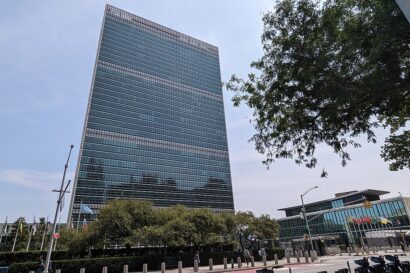More and more countries, including developing countries, are introducing unilateral measures to adapt their corporate tax rules to a digitalising economy. For countries as varied as Kenya, India and Tunisia, this has taken the form of a tax on digital services provided by foreign companies, often referred to collectively as Digital Services Taxes (DSTs), or in some cases Equalization Levies (ELs). DSTs are controversial, and the United States Trade Representative Office recently announced an investigation against many of these countries, which may lead to the imposition of trade sanctions. India’s EL was one of the first, so what can other countries learn from its experience?
India’s EL was introduced in its 2016 Finance Act (‘FA16’) in the backdrop of OECD’s BEPS suggestions in 2015 aimed at a globally coordinated approach. It took the form of a 6% charge on tech giants not having a Permanent Establishment (‘PE’) in India. It was designed to operate exclusively of India’s Income Tax Act and to apply to only certain digital transactions such as online advertisements and other specified services. However, digital e-commerce models, especially the ones operated by non-resident companies, are still unamenable to the traditional rules of taxation, with the government facing a significant loss to the exchequer. In this background, the Finance Act 2020 (‘The Act’) extended the EL’s scope to e-commerce companies, lowered the rate to 2%, and shifted the burden of paying the levy from resident companies paying for services onto e-commerce operators themselves.
E-commerce operators will now be charged on considerations received or receivable by them from e-commerce supplies made or provided or facilitated by them. The scope encompasses all forms of such services intended for Indian residents, non-residents in specified circumstances, and persons availing of such services using an Indian Internet Protocol (‘IP’) address. The widely worded provision might include within its contours all kinds of online transactions ranging from hotel bookings and software purchases to even buying certain components from overseas. It is solely applicable to non-resident e-commerce operators, and so might have a substantial impact on the business models of the e-commerce giants such as Walmart-owned Flipkart, Amazon and ClubFactory.
The Indian government might be going in the right direction, but it will face an uphill task to plug the loopholes within. Notwithstanding the efforts of the government to foster the taxation of the digital economy, the expansion of scope has somehow led to certain unintended consequences.
IP Address: A technical conundrum?
The introduction of the EL on services provided to anyone using an Indian IP address could be applicable to a transaction with no relation whatsoever with India. For instance, a person present in India ordering some goods from Amazon to be delivered to, and paid for by, a relative residing in the United States will be covered within its all-embracing scope. This is contrary to the design considerations for Equalisation Levies suggested by the OECD in 2015, which limited its application to non-resident enterprises with a significant economic presence (‘SEP’) in country. Many internet users resort to a Virtual Private Network (‘VPN’) for a secure connection and to dodge geographic restrictions on websites. A literal interpretation of the provision might cover within its ambit a foreign internet user masquerading as an Indian resident using an Indian IP address on a VPN. In such circumstances, the e-commerce operators will be subjected to the levy even in the absence of any relation between India and such transactions. Needless to say, levying the EL based upon the use of Indian IP will compel e-commerce operators to go great lengths to ensure that they have sufficient means and infrastructure to identify and distinguish IP addresses.
Scope of Consideration: Too much blurred?
The term “consideration received or receivable” used in the Act has created a dubious situation for the e-commerce operators. There seems to be not much clarity on whether the EL will be taxed on the gross amount received by the operator from the customer or merely on the fee charged by the operator for its facilitation services. This could create large distortions because of the different business models currently in use. Some operators retain commission from the gross amount received from the customer before sending the balance to the seller. In other models, the entire gross amount is sent to the seller and the operator receives commission thereafter. The former scenario can prove to be a cumbersome affair for the sellers if they get subjected to EL in hands of the e-commerce operators on the gross amount received. This is because the wording of the EL provision can be misinterpreted to infer that the entire amount paid by the customer (and at first received by the e-commerce operator) is subject to the EL and not just the commission that the e-commerce operator earns from such transaction.
Double taxation: A major stumbling block?
Like many countries’ unilateral digital taxes, the EL is not part of India’s Income Tax Act. This could potentially be burdensome for non-resident companies who might not be able to claim a credit for the EL paid in India against their tax bill in their home country. Instead of addressing these existing issues with the EL, the new amendment has worsened them further. Moreover, the EL tends to swim against the recommendations made by the OECD in its interim report on taxation of digital economy wherein the countries were encouraged to adopt interim measures complying with international obligations including their tax treaties. As the EL is not part of the ITA, it may be interpreted as overriding the provisions of Double Taxation Avoidance Agreements (DTAAs) between India and other nations. Others seeking to emulate India might take a cue here and endeavour to include the digital tax within their primary taxation framework, although in doing so they will need to work round the restrictions imposed by their DTAAs.
All-encompassing scope of EL: Leading to superfluous consequences?
The definition of terms such as “e-commerce operator” and “e-commerce supply or services” has been kept wide enough to cover everything under the sun. A literal interpretation of the new provisions seems to include not only the transactions related to digital businesses, but also the day-to-day transactions of multinational companies involving the use of electronic facilities that are not per se a conventional digital business. For instance, some companies use electronic facilities merely by displaying information about their products and services on a website, while orders are placed offline. Moreover, one can hardly ignore transactions involving online and offline execution. For instance, when booking a room in a hotel abroad, a customer tends to visit its website to make payments. Such transactions might come under the net of “online provision of services”. Similarly, airlines providing online booking, advice given via email, online gaming, streaming, and search engines all appear to come within the scope of the definition. Other countries intending to follow the same route as India have an uphill task in laying down a precise definition for the scope of services they are intending to be covered within the ambit of EL.
Conclusion
Extending the EL to all forms of e-commerce activities is a step in the right direction, but the use of ambiguous terms has led to unnecessary complications. Above all, a clarification in the scope of the definition of “e-commerce operators” and “e-commerce supply and services” is imperative, since these are likely to differ from the Inclusive Framework suggestions and in all probability will not echo the bonafide intentions of the government.
The late introduction of the levy into the Act, and the absence of any debate or public consultation on it, have allowed the revisions to the EL to come into force in spite of the problems we identified. Nine foreign lobbying groups including the United States Chambers of Commerce have written to the Indian finance minister seeking a nine-month deferment along with a stakeholder consultation. It remains to be seen whether Indian tax authorities will respond positively to this request, given that the taxation of e-commerce operators has gained more prominence in light of the Covid-19 exigencies.
Countries looking to take a leaf out of India’s book can certainly learn from this experience. They must ensure that ELs and other new provisions are only introduced after extensive rounds of stakeholder consultation and deliberation.


